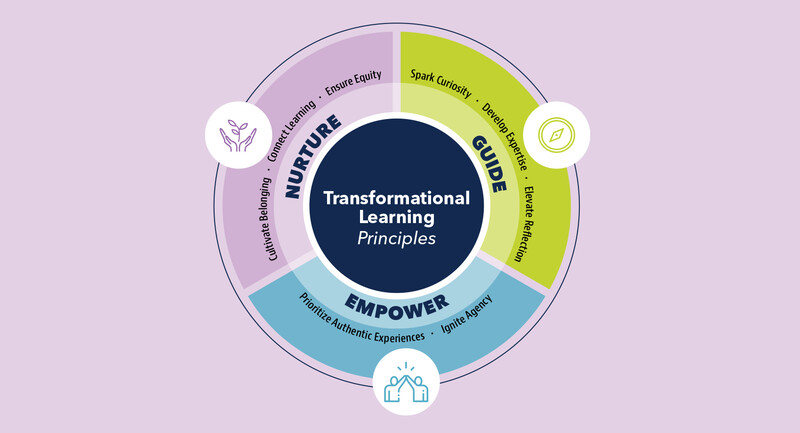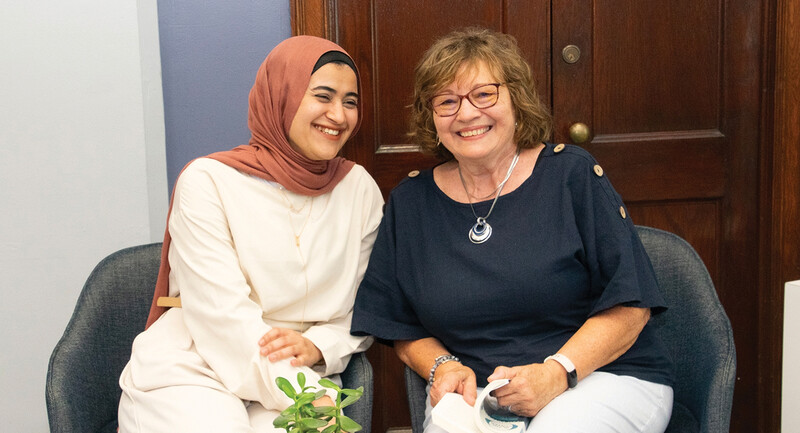Evening sets in as teachers gather in a local classroom. At a distance, the activity resembles a typical professional development session. There is a background hum of overlapping conversations. Facilitators buzz around carrying seeds of insight between tables. Small groups occasionally pause to document thoughts on a whiteboard and engage each other in whole-group discussion.
However, upon closer observation, you can see there's something different in the air. Between bites of food, the teachers chat about their lives while doing math activities for fun. They pore over strips of numeric sequences looking for patterns. They argue, make notes, and laugh aloud as they solve problems and share their love of math. This isn't a typical professional development workshop—it's a group called Math Teachers' Circles (MTC), which brings together teachers to renew their passion for their subject material and rediscover their love of learning. As a facilitator said, "We don't have any expectations except you walking away with a good feeling. We're not trying to say, "And now, 4th grade math achievement will go up because ___." What we're going to do is just be a group that likes mathematics."
Group activities like MTCs are growing in popularity among educators. Teacher book clubs are common and have been around for years (Goldberg & Pesko, 2000). MTCs are newer but expanding. Started by Bay Area teachers in 2006, the MTC initiative is promoted by the American Institute of Mathematics, and there are now 100 active groups in 40 states. In partnership with AIM and the University of Montana, we have been supporting and studying seven MTCs across Montana for five years. The teacher-led groups meet after school, often in the evening—a testament to teachers' desire for more than what's offered within a typical professional learning community. Unlike most professional growth initiatives, elevating pedagogy is not the primary purpose of MTCs. Instead, the point of gatherings, as one participant explained, is "just to enjoy math [and] enjoy each other."
Finding Your Joy
Supporting teachers as whole persons is vitally important for their well-being and ability to serve students, especially as the COVID-19 crisis has added further strain to an already strenuous profession. Even before the pandemic, the teachers we support expressed a need for recharging and rejuvenating. Teachers work hard and can indeed burn out from overexertion. But burnout—which is more a feeling of exhaustion—is different from the sense of demoralization (Santoro, 2019) or even despair (Liston, 2000) that teachers might feel at some point in their careers. Such challenges cut deeper, often arising when educators find the love that fuels their work—love for math, for students, for colleagues, for justice—waning over time or eclipsed by overbearing institutional demands.
Teacher communities responsive to educator needs can help renew a love for teaching. Roughly 50 percent of teachers in the United States quit after five years (Papay et al., 2017). Those who persist mention the value of close collegial relationships and support in pursuing their passions (Cochran-Smith, 2004; Moè, 2016). Teachers participating in MTCs similarly attribute their growing love of teaching to the relationships forged and passions rekindled during gatherings (Donaldson, 2016). By giving faculty time for rekindling joy with colleagues, school leaders can boost teachers' enthusiasm and commitment.
Teachers renew their love for math during a Montana Math Teachers' Circle meeting, where they challenge themselves with activities such as building a weight-bearing bridge with spaghetti and marshmallows (top) or solving a pirate zombie logic problem (bottom). Photos by Fred Peck.
What's Love Got to Do With It?
When we express love for something, we bestow value on it (Garrison, 1997). Teachers who love their subject and their students place high value on both (Bleiler-Baxter, Wanner, & Strayer, 2019). Love is also multifaceted—in real life, our loves overlap and inform one another. Dan Liston and Jim Garrison (2004) highlight three kinds of love that drive good teaching: the need to acquire knowledge, the need for friendship and community, and love of purpose or mission. These distinctions can be useful for understanding teachers' love and a few areas where they are seeking renewal.
The first, love of knowledge and the pursuit of knowledge, is often the spark that starts educators on their careers. Most teachers enter the classroom with passion for what they teach. Over time, rigid objectives and the unrelenting pace of teaching can diminish this passion. Groups like learning circles can rejuvenate it. Teachers in the MTCs we studied have a blast solving logic puzzles involving ravenous pirate zombies, predicting die rolls while playing Tenzie, or seeking patterns while contorting themselves around a twisted circular rope. Participants will often linger after MTC gatherings to discuss answers to particularly challenging problems.
Rediscovering their love of their subject can also fulfill teachers' desire for personal growth, success, and self-actualization. For veteran teachers especially, doing math with students can get tiresome because they always know the answer (and there's little recognition for knowing it). By providing novel problems and a comfortable venue to solve them, MTCs offer teachers a chance to renew their excitement as "math doers" and feel the gratification of accomplishment.
A second kind of love emerges in the strong bonds formed between colleagues. Such bonds allow for disagreement, vulnerability, and meaningful growth. In MTCs, we have seen how teachers appreciate being able to share their disciplinary passion with others who share that passion. During gatherings, one teacher explained:
You don't have anybody, you know, like in a classroom where you have kids saying, "This is stupid. We're never going to use this. I don't know why we have to do this." You know, in that Circle it's just everybody enjoys it and it's just truly having fun. And that kind of atmosphere is just so uplifting, especially when you enjoy something so much.
Doing math for fun with colleagues also supports teachers' growth as educators. During gatherings, teachers share teaching strategies and work through instructional issues while solving problems together (Renga et al., 2020).
The third type of love taps more into teachers' sense of purpose or professional meaning. Teachers participating in MTCs frequently share with us their larger purposes for teaching math. A recurring theme is wanting to expand students' horizons. "I love to open that world for my students," one teacher explained, adding that she hoped to inspire "generations of students that will not hate mathematics; they will love it and they will love to do it, and they'll strap that love to their children." Another teacher told us how she fell in love with math later in life after a challenging childhood. Now as a teacher, she hopes her passion for math "infects" students. Doing math for pleasure in MTCs, these teachers added, keeps the fire burning and thus renews their sense of purpose.
An elementary teacher explores patterns with unifix cubes during an MTC gathering.
Toward Professional Loving Communities
We know that teachers' well-being can benefit from well-designed professional communities, which benefits students (DuFour & Mattos, 2013). But recognizing the importance of teachers' love for their subject areas is one thing; nurturing and supporting it is another.
Many schools have developed some form of professional learning community where teacher teams gather to converse about practice while considering data (usually assessment results) and measurable goals. This is fine, but the teachers we encounter in MTCs seem to be wanting more than the basic PLC model offers. Having inverted the model's priorities to focus on their love—to carve out space "just for us"—the MTC format helps them reclaim a more expansive view of community that humanizes them and promotes their well-being.
So how can school leaders nurture teachers' passion for subject matter and make time for it? Here are two suggestions.
Facilitate connections around shared love of subject matter. The most obvious lesson of MTCs is that teachers who love what they teach aren't uncommon. Good teachers find ways to overcome barriers and act on their passions in support of students and themselves. Reducing those barriers so passion for subject material can flourish requires respectful dialogue between school leaders and faculty around professional expectations and differences of passion. Such openness is a hallmark of healthy school cultures (Deal & Peterson, 1999). Building leaders attuned to the various loves motivating their faculty can proactively catalyze connections between like-minded teachers (and administrators) so they blossom into collegial relationships that revive enthusiasm and sustain professional curiosity.
Professional learning communities as typically implemented are insufficient for this purpose. Most have a rigid focus on improving student learning through data analysis. While PLCs surely do important work, the approach can feel technocratic or overly prescribed. For teachers, this can put a premium on opportunities to unwind and revive the love that drew them to teaching. By inviting faculty to do fun learning activities together, school leaders can support teachers in renewing the passion and purpose driving their practice.
Create space for sustained attention. Schools are busy places where a lot happens between the bells, not to mention before and after them. Concerns over pacing, progress, and productivity keep teachers hyper-focused on the clock and calendar. Opportunities to slow down are rare. Yet they are necessary for authentic learning and the love it engenders.
Teachers need opportunities for sustained attention on what they value. This includes chances to really dig into what they teach, or engage in what Shari Tishman, a senior research fellow at the Harvard Graduate School of Education, calls "slow learning" through observation and the dismantling of things to see what's inside and how they work (Boudreau, 2020).
School leaders can encourage slowing down by setting aside afternoons for MTCs or other forms of personal enrichment with colleagues. They might also provide time during work hours for this enrichment. For example, part of a PLC meeting or an in-service day could include "passion time." This could entail solving complex math problems or discussing poetry, fiction, or something that promotes personal reflection and renewal. Art faculty could also engage building colleagues in some painting time. Physical education teachers might provide yoga sessions. Science teachers might organize lab experiences or lead discussions on cool new discoveries (Is there alien life in Venus's atmosphere?). Whatever the activity, it should emerge from and further teachers' passion for learning. Activities should also be inclusive of and welcoming to everyone in the building.
Humanizing Teachers
Sustaining educators' love of learning is essential to their well-being. It can be hard for teachers to prioritize their own need for renewal. This is because teaching is a caring profession, and teachers are a selfless bunch who rise up in the face of difficulty. But they are also human. When opportunities for rich content learning are introduced, teacher communities can transform to strengthen teachers' passion, connection, and purpose. Doing so is necessary if teachers are to thrive and grow in their profession.









